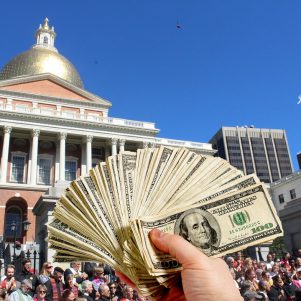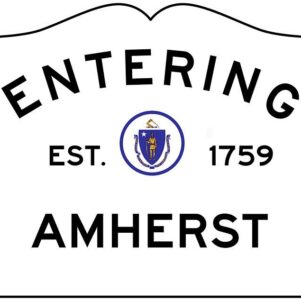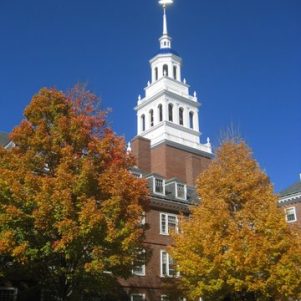State ed board chair gifted Akamai stock to family fund that supports charters
By State House News Service | September 21, 2016, 6:39 EDT
 (Courtesy of Wikimedia)
(Courtesy of Wikimedia) STATE HOUSE — Paul Sagan, a journalist turned technology executive who was tapped in 2015 by Gov. Charlie Baker to chair the Massachusetts Board of Education, stepped into the middle of the fierce election battle over charter schools this summer when he made a sizable donation to the proponents of expansion.
The contribution generated bias allegations from anti-charter school advocates and calls for his resignation given his position as an evaluator of charter schools and their license applications. All of those concerns were summarily dismissed by Baker, himself a supporter of the ballot question, as a “nothingburger” meant to distract from the merits of the debate over charter schools.
Sagan’s financial backing of charter schools, however, runs deeper than a single $100,000 check to the Campaign for Fair Access to Quality Public Schools. And the fount of his support can be traced, in part, to the wealth he has accumulated from a career with Cambridge-based Akamai Technologies.
Sagan graduated from Northwestern University’s prestigious Medill School of Journalism before embarking on a career in broadcast journalism in New York, but by 1998 he had left the newsroom behind and joined Akamai as the company’s chief operating officer.
He would go on to hold the titles of president and CEO before leaving in 2013, but Sagan remains on the company’s board of directors, which paid him $95,000 in cash and $225,000 in stock awards in 2015, according to Securities and Exchange Commission filings by Akamai.
The same filing in March 2016 showed Sagan owned 705,789 shares of common stock in Akamai at the time, which would be worth almost $36.5 million at present-day value. He also works as an executive in resident at Catalyst Partners, the Cambridge venture capital firm where Baker worked between his 2010 and 2014 campaigns for governor.
Akamai, which describes itself as a content delivery network and cloud services provider, is looking to expand into Kendall Square where it hopes to consolidate its operations and add 700 jobs to its 1,700 employee workforce in exchange for tax breaks from the state for its new headquarters, the Boston Globe reported over the weekend.
According to the newspaper, the Massachusetts Economic Assistance Coordinating Council plans to vote on the tax break proposal, the value of which is unknown, on Wednesday in Worcester.
SEC documents show that Sagan has more than once gifted shares of Akamai stock to the “Paul and Ann Sagan Philanthropy Fund,” including 31,250 shares in December 2014 and 30,663 in June 2014.
Sagan and his wife Ann Sagan – both personally and through the Paul and Ann Sagan Family Fund – have been listed as donors in years prior to his appointment to the Board of Education to many charter schools and pro-charter organizations, including the Aspen Institute, The Boston Foundation, MATCH, which operates four charter schools in Boston, and the NewSchools Venture Fund, which previously employed Baker’s Education Secretary Jim Peyser.
The Sagan’s have also given money to the Medill School of Journalism, where a $1 million gift in 2012 was used to establish a journalism fellowship in his name. Sagan is a life trustee of Northwestern University.
While Sagan said he cleared the $100,000 through the Ethics Commission this summer, he has not filed any conflict disclosures with the state Ethics Commission in 2016, nor is it clear that he has any obligation to do so as an unpaid state employee unless he stood to benefit from direct business before the Board of Education.
Nevertheless, the potential for Sagan and his charitable causes to benefit financially from state tax breaks for Akamai has already raised the hackles of the anti-charter school expansion forces who worry about a quid pro quo given the chairman’s history of using his Akamai stock assets to fulfill his philanthropic mission.
“The council’s vote on the special Akamai tax break must be postponed until an independent investigation by the appropriate officials can determine if Chairman Sagan lobbied his fellow members of the Baker administration for a tax break that will directly benefit him,” said Steve Crawford, spokesman for the No on 2 campaign against expanding charter schools.
Sagan, in a statement to the News Service, denied lobbying the administration for Akamai: “I have not had any conversations with anyone in any government regarding any aspect of Akamai’s taxes, including about possible for [sic] tax credits. Any questions about any aspect of Akamai’s real estate decisions in Cambridge or elsewhere, including tax matters, should be directed to the Company.”
Sagan also declined a request to be interviewed about his charitable giving to educational causes, saying, “I consider my family’s philanthropy a private matter.”
“Most importantly, I consider myself a dedicated supporter of all of the Commonwealth’s public schools, district, public charter, and turnaround. It is an honor to serve as Chairman of the Board of Elementary and Secondary Education, and I am focused on working toward maintaining Massachusetts’ position as a national leader in public education,” Sagan said.
In a 2002 Duke Magazine article, Ann Sagan told the alumni mag that she and her husband got involved with MATCH charter schools in Boston after founder Michael Goldstein reached out to her husband about becoming involved. “It was at a time when we were looking for a sort of family project. We were looking to be involved with something personally as well as philanthropically,” she said in that interview.
In addition to a donation, Ann Sagan ended up on the board of MATCH and teaching 10th grade math, calling it “the hardest thing I’ve ever done.” “But I love it. You’ve got to believe every day that you can do this. When you work on the front lines, you get discouraged a little bit. But you have to keep believing that you can,” she said.
The administration, in appointing Sagan in March 2015, said it was looking to the technology sector executive for help spearheading the board’s efforts to choose between two alternative student assessment exams – MCAS and PARCC – and not for his prior support for charter schools.
And while Crawford called the $100,000 donation an “unprecedented” contribution for a public official and a “red flag for voters concerned about the integrity and independence of appointed officials,” much less has been made about Board of Education member Ed Doherty’s position as special assistant to the president of the American Federation of Teachers, a union that has given more than $700,000 to fight the ballot question in Massachusetts.
Crawford said AFT union members across Massachusetts voted “democratically” to support the anti-charter ballot campaign.
All of this points to the vast amount of money flowing within and into Massachusetts from corporate and wealthy donors and national organizations to influence the Massachusetts ballot campaign over charter schools, which if approved would authorize the licensing of up to 12 new charter schools a year in Massachusetts.
The Save Our Public Schools Campaign, organized to oppose Question 2, reported raising almost $6.8 million to fight the ballot question putting the group opposite the more than $10.6 million raised by pro-charter groups behind the campaign, including Great Schools Massachusetts.
Among the donors backing charter school expansion with large sums of money are groups like Families for Excellent Schools and former New York City mayor and media mogul Michael Bloomberg, who gave $240,000 to the cause.
“I think as long as the money is supporting an issue it’s going to be really hard to draw the line based on geography,” Baker said Tuesday on Boston Herald Radio after attending the opening of a charter school in East Boston.
He said, “There are two national teachers unions who are deeply involved in the No on Question 2. The vast majority of the folks that they represent don’t work in Massachusetts, but they’re deeply invested in defeating Question Two here in the commonwealth. We live in an internet age and that makes drawing the lines around state borders on this tough and complicated.”
— Written by Matt Murphy
Copyright State House News Service











